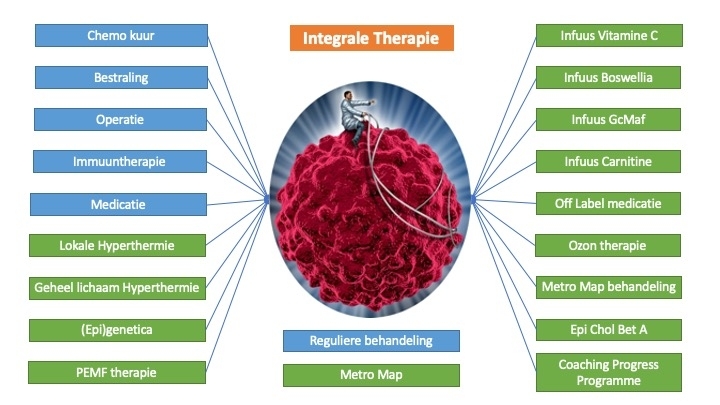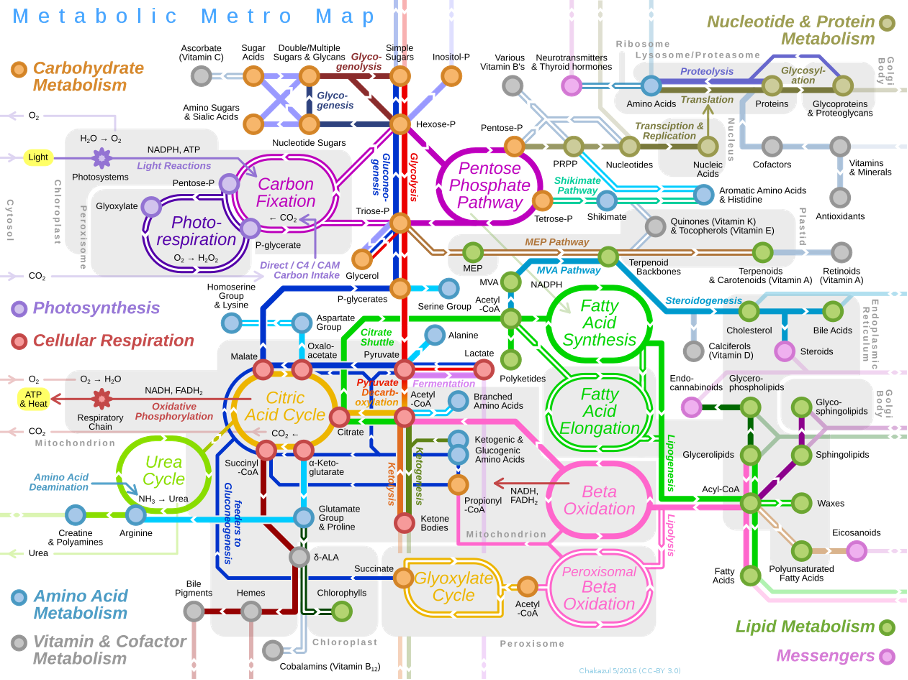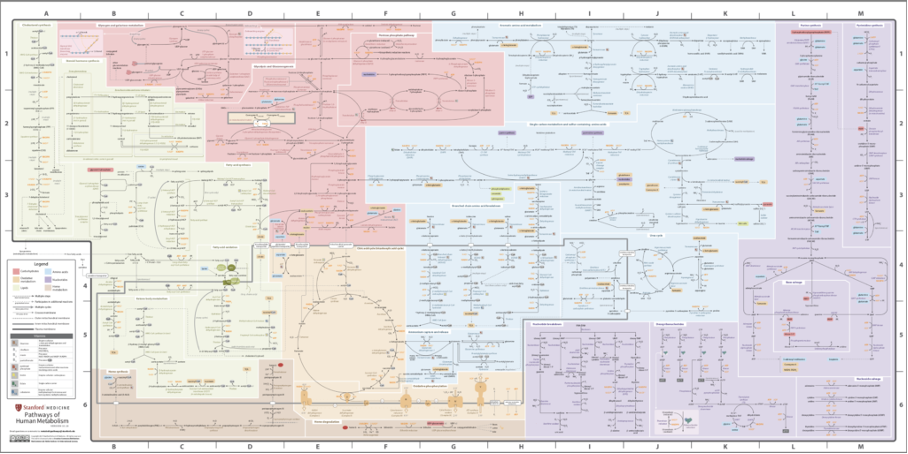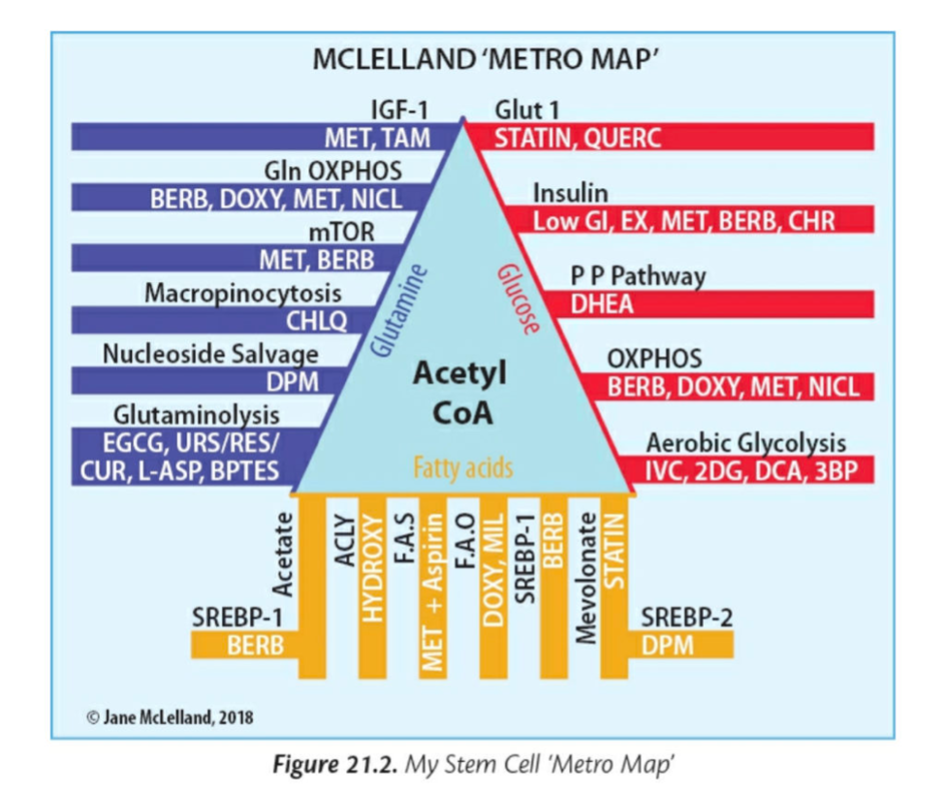What is metabolic support in cancer?
METABOLIC SUPPORT IN CANCER

While oncologists in hospitals are busy effecting their chemo, radiation, surgery, drugs and immune treatments, there is increasing interest worldwide in an integrative or holistic approach.
By an integrated approach, we mean using all scientific and/or well-established methods. Compare it to shooting multiple arrows at one target. See above.
Metro Map Therapy
The founder of Metro Map Therapy is American Jane McLelland. After receiving a terminal diagnosis with only a few weeks to live, Jane threw herself into research.
Jane already had medical knowledge as a Physical Therapist and delved into studies as old as ten years in her quest to survive. Instead of trying to destroy cancer cells, Jane 's approach was to stop their growth. This approach proved very effective for her. There are now clinics following her protocol with remarkable successes. Jane has written a best-selling book "How to Starve Cancer.
What are "off-label" medications?
An exciting research initiative and collaboration between MIT, Harvard and Dana-Farber Cancer Institute reported a new 2020 study in which they systematically analyzed thousands of drug compounds already developed and found nearly 50 non-cancer drugs, including those initially developed to reduce cholesterol or inflammation, that killed some cancer cells while leaving others alone.
Off-label drugs are prescription drugs that are approved do for specific uses to treat specific conditions or diseases. This can mean that the drug is:
- Used for another disease or medical condition
- Given in a different way (such as by a different route)
- Given in a dose other than that on the approved label
Doctors can prescribe a drug for a use not described in the approved labeling if it seems reasonable or appropriate for them. This is called "off-label use.
Cancer supplements:
There are thousands of plant and nutrient compounds that have been shown in preclinical and clinical studies to exhibit similar pharmacological properties to many of the "off-label" non-cancer drugs. Unfortunately, most of these compounds have not been studied with the same rigor compared to FDA-approved drugs, and the lack of standardization in dosing, manufacturing and other quality and safety issues adds more questions than answers about their potential use in cancer treatment protocols. Regardless, the use of anticancer supplements by patients appears to yield results.
Blocking the metabolism of cancer cells:
Researchers have been tremendously interested in identifying drugs that specifically block key cellular metabolic pathways in cancer cells without significantly affecting the function of normal cells. Because cancer cells grow faster than normal cells, they require greater amounts of nutrients and building blocks. Therefore, the use of drugs that disrupt these metabolic pathways or reduce the availability of these building blocks will have a major impact on cancer cells. Cancer cells are unfortunately highly adaptable and they will find other ways to obtain fuel and building blocks to survive. The following diagram (Metabolic Metro Map) illustrates the complexity of cellular metabolism (apart from plan specific pathways, such as photosynthesis).

https://commons.wikimedia.org/wiki/File:Metabolic_Metro_Map.svg
For more details, please find below the latest metabolic "metro map" of humans (Stanford University, School of Medicine, 2018)

Link to high-resolution image:
https://metabolicpathways.stanford.edu/resources/FullSubwayMap221.pdf
The figure below (McLelland "Metro Map," from the book: How to Starve Cancer, by Jane McLelland) serves as a good example of how one could use an evidence-based approach to target several "off-label" non-cancer drugs and supplements that simultaneously target key metabolic pathways used by cancer cells for growth and survival. Blocking one metabolic pathway (e.g., glucose metabolism=preferred energy source due to the Warburg effect) at a time is not effective since most cancers can use other energy sources for survival (i.e., fatty acids, ketones, amino acids).
The best approach is to block all three fuels, glucose, glutamine and fats with drugs and/or herbs because there is no certainty that a given cancer/tumor follows its expected metabolism for its most dominant "preferred fuel.
It is also important to realize that whatever fuel is available, the cancer cells will convert it to the preferred type. This is how advanced cancer cells really are! Cancer cells not only consume glucose, some will even convert glucose to glutamine and others glutamine to fats.
Keep in mind that when glucose is blocked, cancer/tumor cells try to change metabolism to access glutamine and/or fats. This means Autophagy is used to break down cells and recycle them as fuel (very cunning).
This is more common in RAS mutations such as in lung, colon and prostate cancer, but presumably it happens in any cancer.

Destroying/inhibiting stem cells
Unfortunately, like normal stem cells, cancer stem cells possess a wide range of mechanisms to resist treatment. In fact, stem cell properties allow them to survive common treatments such as radiotherapy and chemotherapy. With the aforementioned therapies, although the tumor will shrink as a result of the death of the differentiated cells, a subpopulation of cancer stem cells will remain alive. As a result, a tumor may initially shrink but later reappear. The development of therapies aimed at targeting cancer stem cells will therefore be a major step forward in improving cancer therapies.

